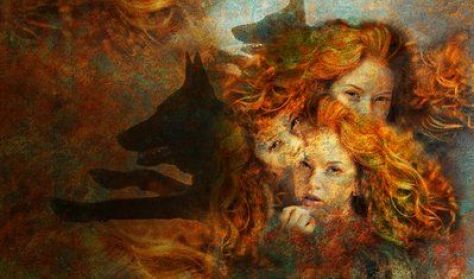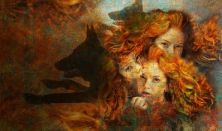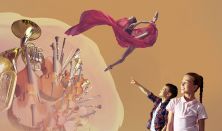
Love and Other Demons
Péter Eötvös: Love and Other Demons
Opera in two acts (2007), Budapest version (2017)
After the novel Del amor y otros demonios by Gabriel García Márquez
more
Nincs aktuális előadás
Ön egy múltbeli eseményre keresett rá. Kérjük, válogasson aktuális kínálatunkból a Jegy.hu keresőjében!
Last event date: Saturday, May 27 2017 7:00PM
Peter Eötvös's fifth opera was commissioned by the Glyndebourne Festival and composed to Kornél Hamvai's multilingual libretto (constructed with elements of Yoruba, Latin and Spanish, in addition to the English) based on Gabriel García Márquez's novella of the same title.
"This fantasy world helps me to concentrate on the music, rather than focus too much on the plot. This is my first opera about love, and also my first quasi-belcanto piece that allows the singers to show off the beauty of their voices," said the composer.
In other words, it has all the makings for an exciting theatrical experience, including a story full of operatic elements (religious intolerance, demonic possession and forbidden love), and Eötvös himself states that this is his most melodic music, while critics have called it magical. And it's all being staged by Silviu Purcărete, the Romanian theatre director renowned across Europe, whose productions are characterized by confident handling of the acting and powerful imagery.
In original languages, with Hungarian and English surtitles.
Commissioned by the Glyndebourne Festival Opera and the BBC.
Act One
In the market, everyone is marvelling at the diminishing sun. At the moment of total eclipse, Sierva Maria, the 12-year-old daughter of the marquis Don Ygnacio, is bitten by a dog.
In the house of the marquis, the courtyard is abuzz with slaves celebrating Sierva Maria's birthday. In keeping with pagan ritual, Dominga, the slave woman who has raised the young girl in place of her mother, paints Sierva Maria black and joins the other slaves in asking for her to be blessed with a long life free of trouble and for her beautiful copper-coloured hair to remain uncut until her wedding day.
Sierva Maria suddenly faints. When she comes to, she informs Dominga that at the market, she was bitten by a grey dog with a full moon on its forehead. The slave woman treats the wound with a powder of lemon and sulphur.
The marquis Ygnacio arrives: the father of Sierva Maria, he has forgotten his daughter's birthday and doesn't even know how old the child is. The shy girl does not respond to her father, instead answering Dominga, whose urging is required before she approaches him after he calls. When he attempts to remove her necklace, the young girl protests so forcefully that her father is terrified. He hands her over to Dominga to have her washed in cold water, because she can only have one family, and that family is a white one.
The bishop summons Josefa Miranda, abbess of the convent of Santa Clara, to discuss the case of Sierva Maria. The abbess has already been informed that the dog was rabid, and that the girl had contracted the illness, since she was already showing the signs: suffering raging pain and speaking the language of the slaves. The bishop and Delaura regard the girl's behaviour as a sign of demonic possession and arrange an exorcism for her. Doctor Abrenuncio examines the girl. Entrusting Sierva Maria to Josefa Miranda's care, they send her to the convent of Santa Clara. The bishop appoints Delaura as exorcist. Even if they can no longer save the girl's body, they might still be able to save her soul. Believing that there is nothing wrong with the girl, and that the cause of her fever is pining for her mother, Dominga protests. Her words, however, fall on deaf ears.
Left by himself, Ygnacio mourns his departed wife, Olalla. Everything in the widowed husband's life has started to fall apart. Even his own body is in decay: at night the bats come and suck his blood.
Doctor Abrenuncio is unable to calm the worried father: although the scab seems to be healing, only time will tell whether the girl has contracted rabies or not. In the meantime, the doctor orders him to fill Sierva Maria's life with joy, since there is no better medicine than happiness.
Josefa writes a letter to Ygnacio regarding his daughter: if the wound has to be healed, it will be. If her soul requires remedy, it will have it. And if the devil has possessed her, he will be driven out. Once again, Ygnacio attempts to take the pagan necklace dangling from the girl's neck, but this simply makes Sierva Maria furious. Only Dominga is able to calm her down.
The nuns at the convent of Santa Clara are singing when another nun leads the young girl in by the hand. In response, Sierva Maria sings a Yoruba song, astonishing Josefa Miranda with her wondrous voice. The abbess nevertheless comes after her to grab her necklace. The girl snarls at her and then bites the arm that is reaching toward her. The nuns immediately see the devil's presence in her: they believe Sierva Maria has turned into a dog with demonic eyes. The abbess gives the order for the girl to be locked in a cell. The walls then start to move, as the decorative reliefs change into diabolical faces and the birds go into a frenzy. The nuns seize the girl and rip off her necklace, leaving the scattered pearls rolling all over the floor. Having deprived Sierva Maria of all her power, they take hold of her and lead her away, entrusting her to the care of Martina Laborde, a mad nun who has been locked up for stabbing one of her fellows. Martina advises the girl to ask her demons to fly her away, because nobody else will. The girl confidently replies that she will be home again in a few days.
Wearing a bandage over his eye as a result of carelessly looking into the sun during the eclipse, Delauro visits the girl, who laughs at his alarming pirate-like appearance. She urges him to take off the bandage, so that he can always see the sun burned into his pupil. Sierva Maria has no wish for Delaura to exorcise the demons from her. Now she intends to hold on to them: at least somebody wants her. She'd like to die, or be turned into stone or made invisible. Then, speaking with the voice of the devil, she demands for Delaura to leave her alone. Nevertheless, Delauro presses on, assuring her that he will cure her, since he loves her. The girl then attacks the priest, who defends himself by holding up the cross in front of him. Left alone in a state of self-loathing, Delaura confesses his love for the girl to the Lord.
Act Two
Delaura tells the bishop of his troubling dream about the girl. Sierva Maria was sitting at a window looking out on a snow-covered field, with a bunch of grapes in her lap. The last grape will bring death. Asleep in her cell weeks later, the girl has the same dream.
Delaura confesses his love to the girl. Together, they quote from the poem that he has taught her, and then they kiss. Entering just at that moment is Josefa Miranda, who immediately expels the young priest from the convent. The abbess reassures the girl that all this is simply the work of the devil residing inside her, and that when it is exorcised she won't remember anything about what has happened. Martina enters the girl's cell and, with the scissors she has brought, cuts off the girl's long hair. Sierva Maria is delighted when Delaura returns: she believes that the day of her wedding has come, since she was promised that her hair would not be cut until then. Josefa Miranda ejects Delaura again.
In the convent's chapel, the bishop is preparing for the exorcism. Sierva Maria is tied to a chair, and the nuns pray. Delaura enters: he is now a broken man, and the brandish their crosses as they approach him. The priest flees, but returns repeatedly. The abbess prays for Sierva Maria, and asks to assume the girl's pain herself. The girl kicks the bishop in the groin, and the walls start to move again. Taken back to her cell, Sierva Maria is delighted to hear a peacock squawking outside: the peacock is the messenger of the pagan goddess Oshun.
As the girl sits on her bed, the walls open up to reveal the dream that she and Delaura both experienced: it's snowing on the field. Sierva Maria recites the love poem she learned from Delaura, and then dies. Dominga mourns the girl as her own daughter.
Our offer
Gaetano Donizetti LA FILLE DU RÉGIMENT Comic opera in two acts, in French, with spoken dialogues in Hungarian, with Hungarian, English, and French subtitles
Fairy tales and music from a far-off land Please note that this programme is in Hungarian and we do not provide any translations.
A 60-minute tour starts every day at 13:30, 15:00 and 16:30 in English. To request a tour in other languages (Italian, Spanish, German, French and Hungarian), please get in touch with the OperaTour team. Please note that the auditorium is closed for visits during rehearsals. Guided tours are not available during performances.
Suggestions
Claudio Monteverdi – Máté Bella L'INCORONAZIONE DI POPPEA (THE CORONATION OF POPPEA) – OPERA EXAM Opera in three acts, in…
Philip Glass / Jean Cocteau LES ENFANTS TERRIBLES A ballet-opera by Philip Glass based on the story by Jean Cocteau,…
Giuseppe Verdi RIGOLETTO Opera in three acts, in Italian, with Hungarian English and Italian subtitles
Warning! The basket time limit is about to expire!
item(s) in basket
total:
Time limit has expired. Please, put item(s) in to basket again.



















